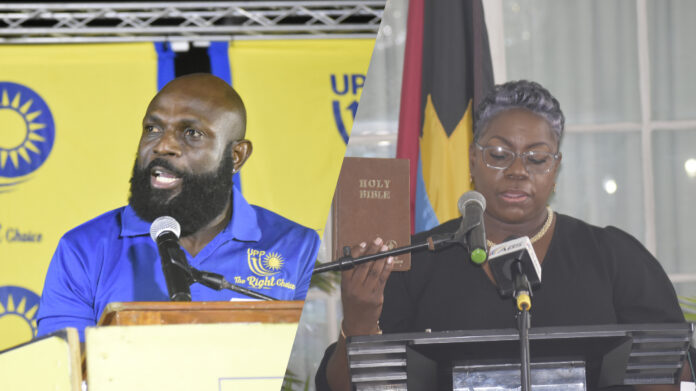
Who Will Lead the ABLP After Browne?
By Kieron Murdoch | Opinion Contributor
While much of the leadership talk recently has focused on the United Progressive Party (UPP) given its turmoil since a leadership convention in April, in 2023, immediately following the general election, all of the attention was centred on the leadership of Prime Minister and Antigua and Barbuda Labour Party (ABLP) Leader Gaston Browne. How quickly the focus shifts in politics.
The UPP’s post-convention turmoil had effectively stolen all attention away from any discussion on the effectiveness and palatability of the leadership of the ABLP. Yet, in the aftermath of the ABLP 1-seat majority victory in January 2023, commentators argued that the ABLP ought to consider the day when Browne would become an unviable leader. The question is, who would replace him if such a day were to come?
Will it be one of the old guard, or the new guard? It all depends on when the current leader leaves or is ushered out, and the circumstances at the time. Of the present Labour slate, besides the Prime Minister, the obvious names who appear to be likely to carry on running in elections are Maria Browne, Chet Greene, Daryl Matthew and Melford Nicholas.
Sir Robin and Sir Molwyn will either retire before running in the next election, or even if they ran again, neither would fight for party leadership at their age and stage. Neither would Sir Steadroy, if he runs again, as he has promised recently to do. Max Fernandez’ future is unclear. Some suggest he is aiming to retire, but he has never publicly declared it.
Foreign Affairs Minister and St. Paul’s MP E.P. Chet Greene is the most zealous contender for the ABLP leadership. He has occupied the post of party Chairman for some time now and seems to be positioning himself for the role of leader. What would a Chet Greene premiership look like? Rumours abound of a battle for influence within the party between himself and the Leader.
But parties hardly change leaders while in office unless those leaders are too old, too decrepit, or too disliked within their own party to carry on. Gaston Browne meets none of these criteria at the moment regardless of how despised he may be by many others. Logically, the opportunity to replace him would need to come when the party loses power. But, as we discussed, the UPP’s self-inflicted wounds of 2024 seem to have guaranteed a Labour win should an election be called in 2025 or 2026 for example.
If Greene were to challenge Browne while Browne is the sitting PM, one might think that there would have to have been a herculean amount of political manoeuvring on Greene’s part in order to get the party to turn in majority against a sitting leader who has won three elections and seems poised to win another given the collapse of any serious challenge on the opposite side.
Browne could step aside at any time. But why would he? He’s not that old (57), appears in good health, and has given few indications that he has grown tired of his post. Neither has his party grown wary enough of him to warrant his stepping aside. He is in fact younger than Greene (60) by around three years.
So, realistically, when will the opportunity most likely present itself? Having won in January 2023, Browne’s leadership can carry forward until 2028. If he wins an election in 2028 or anytime before, his leadership could carry on until 2033 or earlier depending on how early the next election is called, if not in 2028.
If the ABLP loses the next election in 2028 or anytime before, that presents a clear opportunity. But a Labour loss then would mean that any new Leader’s opportunity to take the party to victory and claim the premiership is only likely to come nearer to 2030 or in the 2030s. If the PM wins the next election in 2028, but loses a subsequent one, it means his replacement will be eyeing an even farther away opportunity to become premier, perhaps nearer to the 2040s.
This assumes that once he wins an election, even if by a slim majority, he will remain the favoured choice of his party, or he will at least have enough power to sideline other contenders. As we mentioned, parties in the Caribbean less often change leaders while they are in office. They more often do so in opposition.
And even when a leader loses an election, is thrust into opposition, has already served their time as Prime Minister, and ought to make space for another option, they are hardly ever willing to make way peacefully. They often fight doggedly, meaning that a loss for Gastom Browne in any upcoming election, should not be taken as a guarantee that he will lose the post of Leader.
Besides Chet Greene, perhaps we should not discount Maria Browne (33), who is still in the category of very young politicians. She may be poised to lead the ABLP back to office after any future defeat should she be able to capture the imagination of the party, particularly the younger generation, and should she be able to rally other candidates of her generation around her. At the same time, depending on what state her husband’s reputation is in when his leadership is at an end, her chances may be spoilt by association.
Another interesting point is that if a Chet Greene or Daryl Matthew or Melford Nicholas or Maria Browne wanted to assume leadership, and the opportunity only presented itself around the 2030s, then there would be more options on the party slate by then who may be more palatable to the party than the remaining 2014/2018 Browne-era ministers.
If we’re talking about options in the Labour Party, why not a Prime Minister Michael Joseph, or Rawdon Turner, or Anthony Smith (Labour to be)? Surely, one of them or any other newer faces could pitch themselves as the future of the party.
Ultimately, unless the Prime Minister intends to voluntarily step down after many years at the helm, or unless he loses the next election, we do not have a serious opportunity presenting itself to any would-be new leader to replace him. As mentioned, leaders usually get ousted when they are in opposition, having lost an election. How likely is it that the ABLP will lose the next election?
Given the current state of the UPP, the ABLP will likely be more competitive in any upcoming election. The opposition has made a controversial pick for leader and has suffered an involuntary purge as a result. Whether it will be reorganised, reinvigorated and ready for the next election is anyone’s guess. What’s certain is that the Prime Minister will not seek to give them time to correct their mistakes.
As well, the dynamics in the various seats also seem to weigh more heavily in Labour’s favour. Some would argue that Richard Lewis’ candidacy has been politically damaged by the UPP leadership battle. Meanwhile, his new opponent, Michael Joseph, is seen by many as far more viable than Gale Christian. The death of the MP for St. Peter will cause a by-election there soon, which Labour will very likely win over the UPP, which has not won there in decades.
Sir Robin’s Labour seat has been shored up with fresh blood. Meanwhile, Anthony Smith has taken a UPP seat over to Labour and is working on becoming the Labour MP for All Saints West following the next election. None of that bodes well for the opposition, and it seems to suggest that Gaston Browne, whose leadership looked shaky after a 1-seat victory in January 2023, has been given a new lease on power for the foreseeable future.
About the writer:
Kieron Murdoch is an opinion contributor at antigua.news. He worked as a journalist and later as a radio presenter in Antigua and Barbuda for eight years, covering politics and governance especially. If you have an opinion on the issues raised in this editorial and you would like to submit a response by email to be considered for publication, please email [email protected].






0 Comments